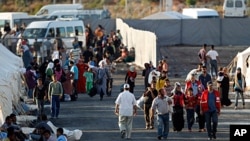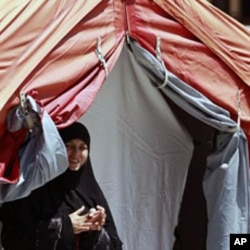The Assad government's violent repression of a five-month-old popular uprising is sending thousands of Syrians into Turkey and Lebanon as refugees. Several hundred of them recently sought food and medical assistance at a mosque in northern Lebanon's Wadi Khaled region, a few kilometers from the Syrian border.
It is early afternoon at the Makhtoum mosque near the Syrian border. Lebanese relief workers are distributing aid to refugees who fled the violence in Syria.
Ali Mohamad al-Kurdi, 60, arrived two months ago with just the clothes on his back. Syrian militiamen raided his home. He says they killed and mutilated five young men in his family.
He says he is going to stay here until the regime falls and if the regime doesn't fall then he will kill himself here. He says no one is supporting the uprising, no countries, no nations. So it is better to commit mass suicide together here.
Syria Turmoil
Human rights groups say an estimated 1,700 people have died in the uprising and nearly 3,000 have disappeared. The Syrian government says it is pursuing armed terrorists. Dissidents say the only ones with arms are government troops and their militias.
Abdullah Tassi works with a local donor group, the Bekaa Youth for Development and Free Education. He says there are about 5,000 Syrian refugees in this area. When they first arrived they thought they would stay for just a few days.
“But after days go on and on, now they believe they are going to stay here for a long time. Some of them are trying to mingle with the [local] people and many of them are going to villages far from here, said Tassi.
A half-dozen women are pressed against the side of a mobile clinic parked near the mosque. From a window a nurse writes down their names and gives them medicine.
Fear-stricken
Medical Assistant Kassim Ayoubi says most of the physical illnesses of the refugees are routine, like the flu. But mentally, he says, these people are traumatized.
He says they are not at all at ease. Mentally they are tired. There's fear, especially fear of being filmed.
Thirty-three year-old Um-Hamza cradles her baby in her arm and covers her face with her shawl. She gives only her first name out of fear.
Um-Hamza fled her home in Homs one month ago because her seven children were terrified. Yet, she remains defiant.
She says with God’s will, we will return because we have a will. We want our freedom. She says we want to live the same as others do. We don't hate anybody but we are persecuted. We want to lift the oppression from us. What if we sacrifice? What if a lot of us die? She says, it is not a problem.
Weakness exposed
An expert on Syria with London's Chatham House, Nadim Shehadi, says the Syrian uprising was a long time coming. This is because a regime that has survived for 40 years, like that of Bashar al-Assad and his father Hafez al-Assad - does so by not allowing alternatives to emerge. But he says once its weaknesses are exposed it collapses.
"People woke up and realized that they have an alternative to living under a dictatorship of one man and his family and his cronies and having no say in their own future. And once people realize this it's irreversible," said Shehadi. "And no amount of reform can maintain a regime in power once that illusion is broken."
A young man with close-cropped hair has been following the food distribution. He says his name is Hassan al-Hassad and shows his Syrian passport.
He says he was a lieutenant in the Syrian army until one month ago when he defected and snuck across the border.
Syrian dissidents in Beirut confirmed his story was true.
Al-Hassad said several thousand other soldiers have defected from Syrian security forces. Led by a rebel-general based in Turkey, they are organizing a new army.
He says with the help of God, we are gathering together to stand against the oppressor, President Bashar al-Assad, and to support the defenseless Syrian people, in a peaceful way.
As the uprising continues and the repression intensifies, Syrians are calling for more international support, namely sanctions and diplomatic pressure. But they say they do not want foreign military intervention because theirs is to be a non-violent revolution.





